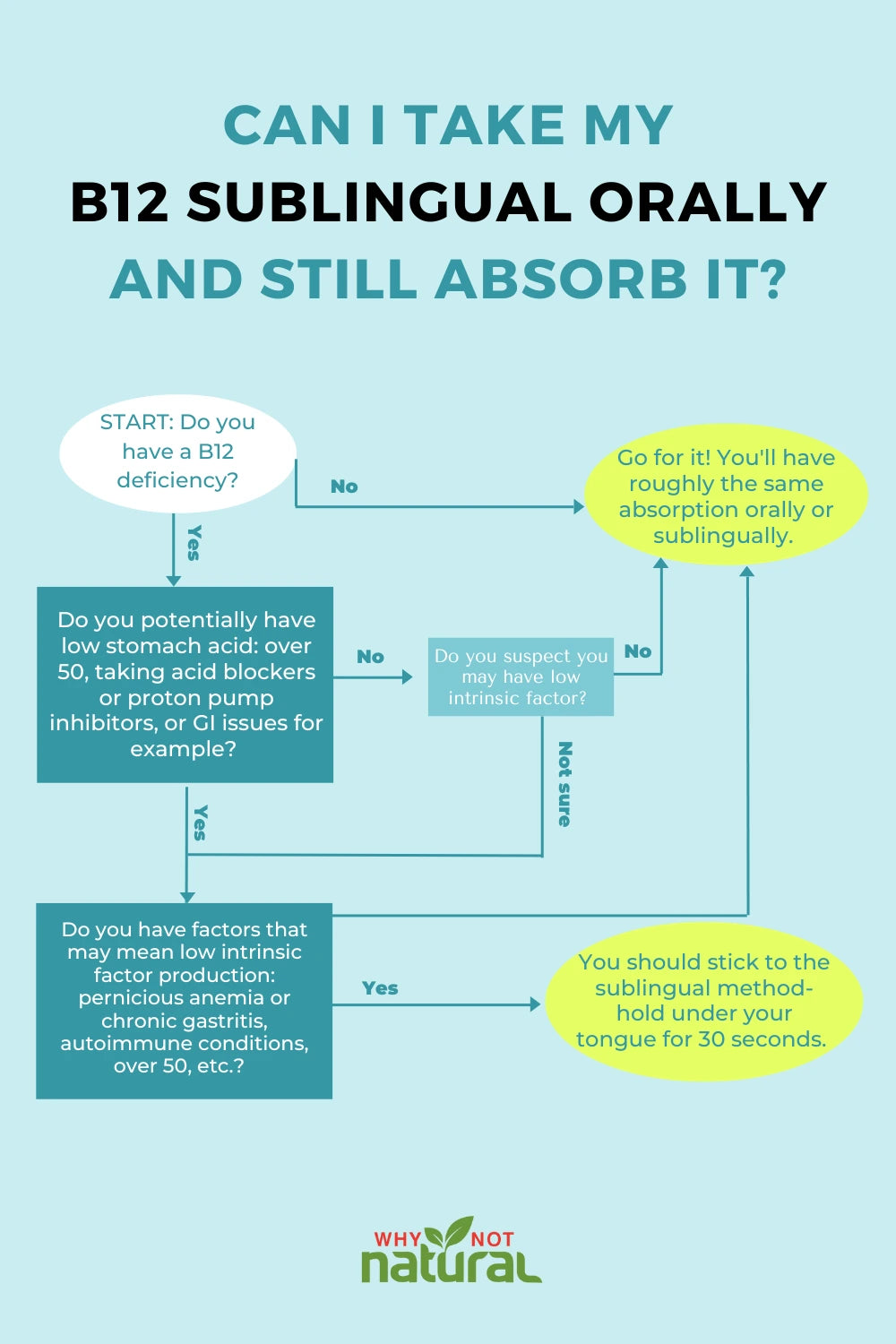

· By Kelin Marquet
Sublingual B12 - Is it More Effective to Take it Under Your Tongue?
Vitamin B12 is an essential nutrient that supports red blood cell formation, DNA synthesis, and neurological function. Many people believe that the best way to take vitamin B12 is sublingually, but not everyone enjoys holding a liquid or tablet under their tongue.
A common question we receive is whether our Why Not Natural vitamin B12 liquid is still absorbed when taken orally, especially when stirred into a morning drink. The answer depends on several factors, but most people should have no difficulty with either method.
Here’s a closer look at why someone might supplement with B12, how sublingual absorption works, and how to get the most out of your routine.
Vitamin B12 Basics
Vitamin B12 is part of the group of essential nutrients known as the B Complex. It naturally occurs in animal products like meat and seafood. However, some people may still have low levels due to factors such as diet, age, digestion, or reduced intrinsic factor production.
Do You Need to Take B12 Sublingually?
The area under the tongue contains mucous membranes that allow certain nutrients to enter the bloodstream directly. Sublingual vitamin B12 supplements are meant to be held below the tongue for roughly 30 seconds.
This approach is often preferred by people concerned about digestive absorption. However, B12 in supplement form does not require strong stomach acid to break it down, so many individuals are able to absorb it well even when they swallow it normally.
Those who produce less stomach acid, such as people over 50 or individuals taking acid-reducing medications, may not absorb B12 from food efficiently. These same factors do not necessarily prevent absorption from a well-designed supplement.
So does sublingual absorption lead to a higher absorption rate? It depends on individual factors, including how much intrinsic factor the body produces.
Sublingual B12 vs. B12 Injections
A 2019 study comparing intramuscular injections with sublingual vitamin B12 found that both methods supported healthy B12 levels in participants. In this study, sublingual delivery performed well for individuals with low levels. (1)
Sublingual B12 vs. Oral B12
Another study compared sublingual versus swallowed B12/B-complex tablets in people with low B12. Both groups experienced improvement and there was no meaningful difference between oral and sublingual methods. (2)
Good news for anyone who doesn’t love holding liquid under their tongue.
When Sublingual B12 May Be Helpful
Some people may benefit more from sublingual use, particularly those with low intrinsic factor production. Intrinsic factor is a protein that supports normal B12 absorption. (3)
Low intrinsic factor may occur in people with certain health conditions or digestive challenges. Some factors associated with low intrinsic factor include:
-
Being over 60
-
Northern European or Scandinavian ancestry
-
A family history of intrinsic factor issues
-
Autoimmune conditions such as Type 1 diabetes
-
Surgeries where part of the stomach has been removed
Other factors that may affect intrinsic factor or overall B12 absorption include:
-
Stomach lining inflammation
-
Conditions affecting the small intestine
-
Long-term use of antacids
-
Disruption of gut flora
-
Certain gastrointestinal infections
If any of the above apply, holding B12 sublingually for 30 seconds before swallowing may be helpful. Even without intrinsic factor, a small amount of B12 can still be absorbed through passive diffusion. (5)

Summary
If you don’t have risk factors for poor absorption, you can take your liquid B12 orally or mix it with your beverage. Most people will absorb it either way.
If you believe you may produce a lower amount of intrinsic factor, using it sublingually is a reasonable approach.
Want More Tips?
You can subscribe to our newsletter for guidance on supplement routines, combining nutrients safely, and general lifestyle tips for supporting energy and wellness. Click here to get started!
Disclaimer
The statements in this article have not been evaluated by the Food and Drug Administration. The products mentioned are not intended to diagnose, treat, cure, or prevent any disease. Please check with a doctor before starting any new supplement and to ensure the advice in this article is right for you.
Resources
(1) Comparison of sublingual vs. intramuscular administration of vitamin B12 for the treatment of patients with vitamin B12 deficiency.
Merav Jacobson Bensky, Irit Ayalon-Dangur, Roi Ayalon-Dangur, Eviatar Naamany, Anat Gafter-Gvili, Gideon Koren, Shachaf Shiber
https://pubmed.ncbi.nlm.nih.gov/30632091/
(2) Replacement therapy for vitamin B12 deficiency: comparison between the sublingual and oral route.
Amir Sharabi, Eytan Cohen, Jaqueline Sulkes, Moshe Garty
https://www.ncbi.nlm.nih.gov/pmc/articles/PMC1884303/
(3) Vitamin B12 replacement therapy: how much is enough?
D. T. Watts
https://www.ncbi.nlm.nih.gov/pmc/articles/PMC4993789/
(4) Vitamin B12 Deficiency
Alex Ankar, Anil Kumar
https://www.ncbi.nlm.nih.gov/books/NBK441923/
(5) How I treat cobalamin (vitamin B12) deficiency
Ralph Carmel
https://www.ncbi.nlm.nih.gov/pmc/articles/PMC2532799/
